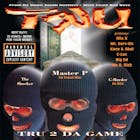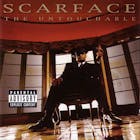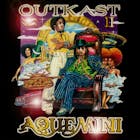
Classic Albums: 'Ghetto D' by Master P
Classic Albums: 'Ghetto D' by Master P
Published Fri, September 2, 2022 at 12:00 PM EDT
When it comes to Hip-Hop, New Orleans footsteps had been getting louder and louder.
The rap game in Louisiana was bubbling when Master P dropped 1996s Ice Cream Man, and finally broke through nationally. The South was clearly making noise: the Geto Boys landed mainstream attention back in 1991; platinum-selling artists like Kris Kross and Arrested Development came out of Atlanta in 1992; Memphis legends Eightball & MJG dropped their classic underground debut Comin' Out Hard in 1993; and renowned ATLiens OutKast, Goodie Mob and the Dungeon Family released landmark albums from 1994 through 1996.
And there had always been an independent spirit throughout the South. Luke Records in Miami and Suave House in Memphis; J. Prince's street-level approach with Rap-A-Lot in Houston, it all spoke to the DIY ethos of the region. The South was used to being ignored by the major labels out of New York City and Los Angeles. But where others had remained unapologetically off the beaten path of mainstream rap; New Orleans native Master P had his sights set at the charts by 1997.
Percy Miller had launched his own record store in Richmond, CA; following a short stint as a college athlete at the University of Houston, which had led him to Merritt College, where he planned to major in business. But it was an inheritance that led his fate down an unexpected path; and P took the money he was willed from an uncle and opened his own record store, No Limit Records, in Richmond in the late 1980s. The store soon became homebase for his burgeoning label of the same name, and through his own independent releases--including collaborations with his brothers (as TRU) and indie West Coast acts—Master P built a sizable following after releasing independent albums like Get Away Clean, Mama's Bad Boy and The Ghettos Tryin to Kill Me! and he soon relocated No Limit to his hometown of New Orleans and started filling his roster with local talent like Mia X, Fiend and Mr. Serv-On.
No Limit's stock was steadily rising across the Dirty South; with distinctive beats and rhymes about the drug game. No Limit had been building a buzz for years delivering the kind of music that spoke to trappers from Georgia to Texas. But P wasn't aiming to be an underground king—Master P had the production, packaging and platform to storm the mainstream. In 1995, No Limit inked a deal with Priority and the seeds were sown for Master P to make a major push towards more mainstream visibility. And in 1996, No Limit signed N.O. product Mystikal, who'd just released his sophomore album on Jive Records in 1995 and enjoyed a major regional hit with his single "Here I Go." Master P released his breakthrough album Ice Cream Man in 1996; and in early 1997, TRU's Tru 2 da Game would be another milestone—eventually becoming a platinum-seller.
It set the stage for a major takeover for No Limit. And in August, Master P would drop the album that cemented the label's rise. And the album's title track was a reworking of a bonafide rap classic.
The sonic imprint of Beats By the Pound had also started to peak. No Limit Records wasn't known for producing stellar rhymers, but the label's distinctive production was making waves. And on Ghetto D, Master P's beatmaking secret weapon fully grew into its own. In August, No Limit's ever-growing fanbase got to hear what would be the label's next major leap.
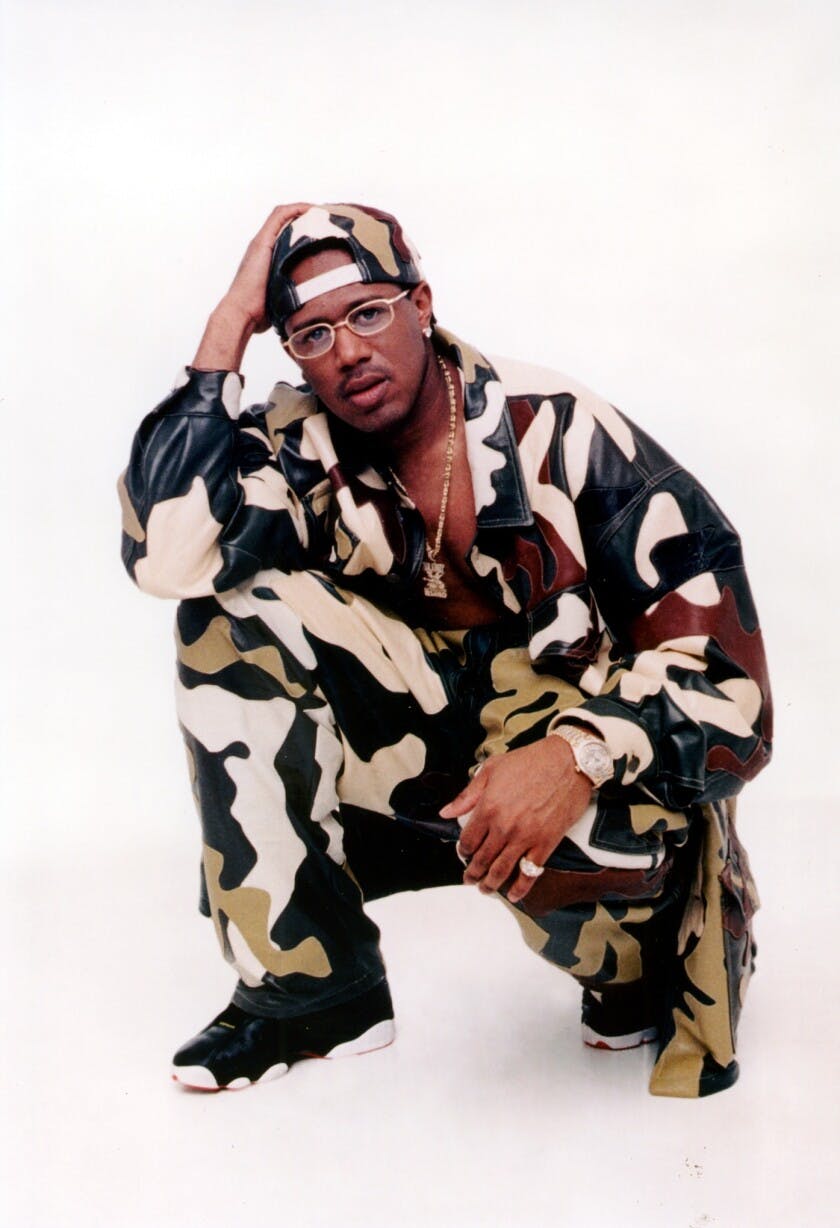
In August 1997, Rakim hadn't been heard from in five years and the time away amplified his legend amongst East Coast Hip-Hop heads. "The R" would make his return with The 18th Letter that November, but it took some nerve for Master P to take one of Rakim's signature songs ("Eric B. Is President") and reimagine it as a Down South dope-boy anthem. P's breakdown of crack selling leaving no mystery as to what Ghetto D's focus is going to be.
"Let's Get 'Em" was as ominous as a Suave House track, with P trading in familiar territory: dope slangin.' Silkk's erky-jerky flow shows up in full confrontational mode, but the standout here is a scene-stealing Mystikal guest verse made it apparent that the so-called Prince of the South was fully at home on P's rising rap label.
Twinkling piano keys form the backdrop of "We Riders," another in what's becoming a long line of Master P songs that sound like him attempting to channel 2Pac's flow and persona. It's hard to hear the influence of songs like Pac's "No More Pain" here, as P rails against enemies and tosses off a hook that echoes Pac's "Ambitionz As a Ridah." And "Throw 'em Up" features a more melancholy production, but the subject matter doesn't waver far from the same kind of street machismo that had become P's trademark by this point.
DROP YOUR EMAIL
TO STAY IN THE KNOW
A sped-up sample of the Isley Bros' "For the Love of You" (also sampled by 2Pac on the Thug Life classic "Bury Me A G") forms the backdrop of "Tryin' 2 Do Something" a moment for P to slip into mack mode, with guest appearances from Fiend and Mac (along with Mo B. Dick singing the hook.) The thug love theme continues on "Plan B," on which P advises a woman of interest that "I can be yo nigga, he can be yo man," once again echoing Pac--who'd covered similar territory a year earlier with "I'd Rather Be Ya Nigga" from his multiplatinum album All Eyez On Me. The Mia X verse keeps things from being too derivative, as she injects some much-needed femme fatale energy into the track.
Master P song titles could be unapologetically blatant and one such example is "Weed & Money." P raps about--wait for it--weed and money, over a slow-rolling groove from Beats By the Pound. "Captain Kirk" finds P doing a pretty obvious bit of E-40ism. The production, P's flow, and the subject matter and hook are clearly indebted to 40's equally misogynistic "Captain Save-A-Hoe" from 1994. Like 40's song, "Captain Kirk" is P's chance to mock those who would splurge on shady women--with Fiend, Mystikal and Silkk riding shotgun.
Late 90s mainstream rap albums were built on the backs of glossy 80s R&B samples and Master P was no different. "Stop Hatin" is a retread of the oft-sampled hit "Rumours" by Timex Social Club; and "Gangstas Need Love" features an interpolation of Diana Ross' "Missing You" (released only about six months after the Notorious B.I.G. flipped the same sample on his "Miss U"). The most inspired is "Bourbons & Lacs," which slows down Marvin Gaye's "Sexual Healing" for a song so laid back it almost feels chopped and screwed.
But the album's lead single went slightly further back than the Reagan era for its familiar hook. "I Miss My Homies" reimagined The O'Jays "Brandy" as an ode to comrades slain in the streets. Featuring No Limit mainstays Silkk the Shocker, O'Dell, Sons of Funk, Mo B. Dick and Mercedes, as well as UGK legend Pimp C, the single preceded Ghetto D by three weeks and became Master P's first Top 25 Billboard hit in August 1997.
The musicality of Beats By the Pound's productions are most notable on the tracks that don't sound like retreads of other ideas. "After Dollars, No Cents" sits comfortably between Nawlin's edge and Bay Area groove, and "Come and Get Some" is the most effectively menacing track on an album that has no shortage of confrontational anthems.
Upon the album's release on September 2nd, 1997, Ghetto D drew immediate controversy due to it's original cover. The album artwork featured a crack addict sitting on a curb, smoking a pipe. The fumes from the pipe turned into a collage of No Limit album covers. The original album was pulled and reissued with a new, less provocative cover. The video for "I Miss My Homies" became Master P's first video in heavy rotation on MTV, but it would be eclipsed by "Make Em Say Ugh" in a few months.
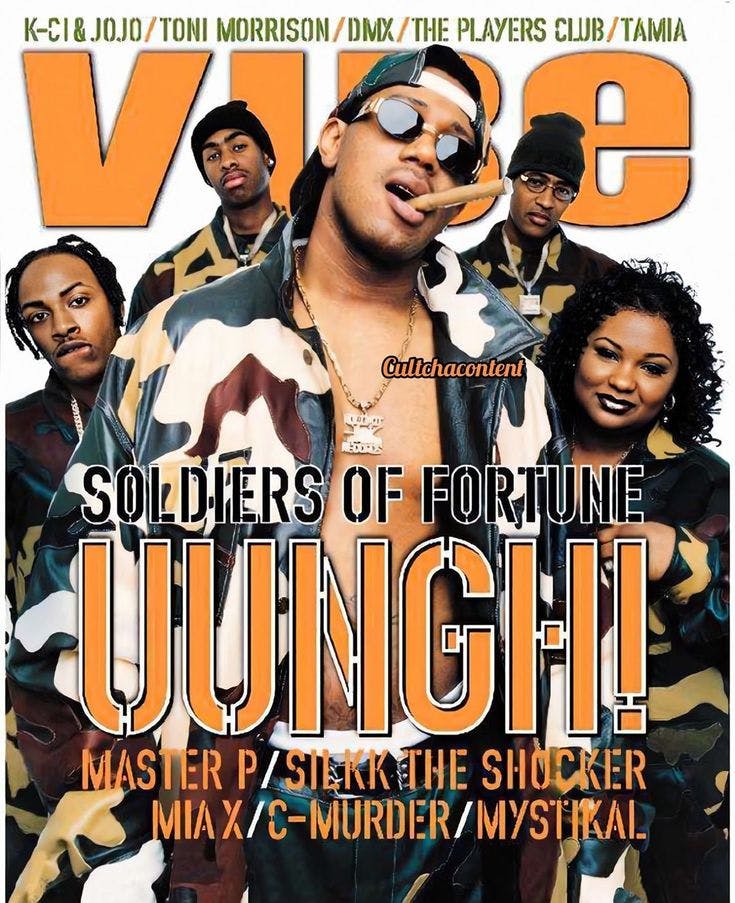
Master P's first major crossover hit, "Make Em Say Ugh" was a standout on Ghetto D; with its infectious synth horns and bouncing beat--it was an easy party starter in the fall of 1997 after the album was released. The official single wouldn't appear until January, when P rolled out the soon-to-be platinum hit with a glossy video that featured the No Limit roster on basketball court (complete with Shaquille O'Neal cameo.)
But Master P's rise to stardom was evident. Ghetto D would eventually sell 3 million copies and over the next two years, No Limit Records would flood the marketplace with releases from Silkk the Shocker, Mystikal, Fiend, C-Murder and Mia X, alongside Master P albums, movies from No Limit Films and soundtracks for those movies.
The mainstream rise of No Limit happened without the kind of East Coast pandering that had accompanied So So Def and it didn't have the kind of major label cosign that the Dungeon Family enjoyed on LaFace. And it set the stage for the emergence of another burgeoning Nawlins-based label: Bryan and Roland Williams' Cash Money Records, which would enjoy a similar breakthrough in late 1998. Also in 1998, rap superstar Snoop Dogg would defect to No Limit Records, affirming the label's stature as a major player in the music industry.
Master P proved that southern rappers could be unapologetically themselves--even if critics from NYC and L.A. couldn't understand them--and still take the charts. Master P and his No Limit acolytes weren't simply regional stars, they were on MTV and BET alongside the bigger names in the industry. Ghetto D's success is an important milestone in the rise of southern Hip-Hop; it arrived in that moment after the door was kicked down but before the South began to dominate popular rap. The former period laid the foundation for the latter to take things to full fruition, and in the middle, there was Master P. The self-made man who turned No Limit into an unlikely powerhouse after the fall of Death Row and the demise of the Notorious B.I.G. Nobody saw him coming.
All eyes were now on the South.
